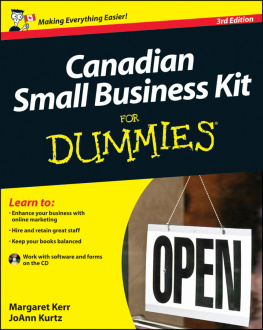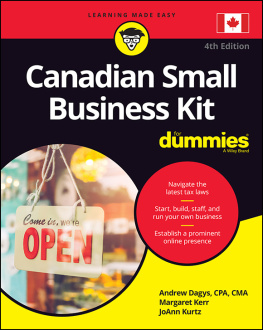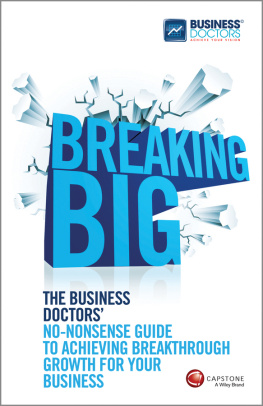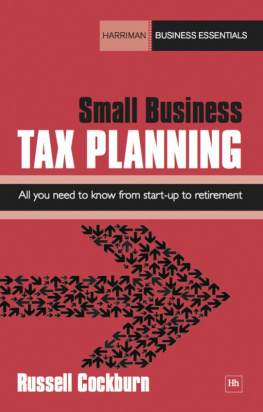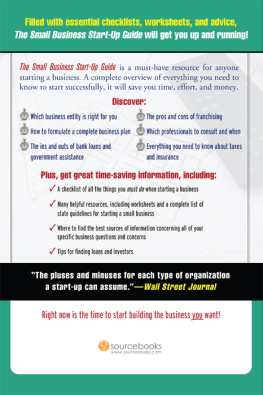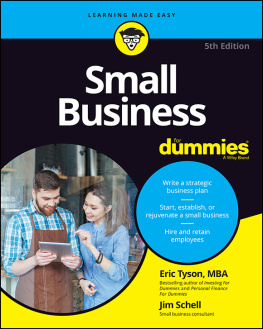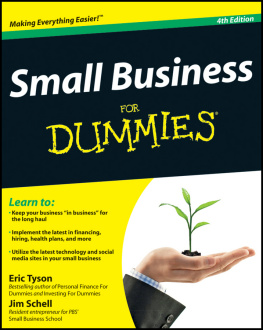How to Start and Build a Small Business
Robert D Hastings
~~~
Smashwords Edition
Copyright 2013 by Robert D Hastings. Allrights reserved.
No permission is given by the author to copyor distribute this book
Smashwords Edition, License Notes
This ebook is licensed for your personalenjoyment only. This ebook may not be re-sold or given away toother people. If you would like to share this book with anotherperson, please purchase an additional copy for each recipient. Ifyoure reading this book and did not purchase it, or it was notpurchased for your use only, then please return to Smashwords.com and purchaseyour own copy. Thank you for respecting the hard work of thisauthor.
Nothing in the world can take the placeof persistence. Talent will not; nothing is more common thanunsuccessful men with talent are. Genius will not; unrewardedgenius is almost a proverb. Education will not; the world is fullof educated derelicts. Persistence and determination alone areomnipotent. The slogan press on has solved and always will solvethe problems of the human race.
Calvin Coolidge
TABLE OF CONTENTS
FOREWORD
You may be looking to purchase or start abusiness or you have already done so and are searching somemuch-needed information on the basic tenets of business start-up,management requirements and the range of resources you willneed.
In this book we have researched a great dealof information, reviewed current successful businesses and reviewedmany failed enterprises to understand why business succeeds andconversely, fails.
This book is written by an author withexperience in setting up new business in a range of industries andhe has witnessed first-hand the reasons for great success andfailure of commercial enterprise.
Our lesson on Business Planning at the end ofthe book is of great value in business start-up mode and will offeryou a range of business options to review and research as you goforward with your enterprise.
In any business start-up or development weurge you to seek professional advice at all times and to ensurethat you have a thorough understanding of the risks involved as youmove forward.
The essence of risk taking is to minimize itwhere and when possible.
After following the question profiles andbusiness plan requirements in Starting and Building a SmallBusiness you realize that your new or existing business willrequire further planning or changes we suggest you review thoserequirements and write them down.
ABOUT THEAUTHOR
Rob Hastings. Dip Mkt, Grad Dip Mgt, MastersBusiness Administration.
Rob has worked in five of his own businessesover the past 25 years and the majority of those businesses were onsold profitably. He has penned a number of works on smallbusiness.
Rob holds great passion for small business incompetitive markets and he has held a range of senior roles fromManaging Director and General Management to National Sales Managerof Public and Privately list companies.
Most of his previous roles have been in bluechip companies in the business market. He holds internationalexperience and managing companies with 100+ staff. He holds broadexperience in development of new markets and channel based B2B andB2C distribution.
Rob is married and works within the businesscommunity.
SMALL BUSINESSIN REVIEW
All countries throughout the world havehorror statistics regarding the survivability of small businesswithin five years of start-up. Yet, many businesses are started ineach year in countries with highly developed economic systems tocountries that can barely manage their small economicdevelopment.
In Australia for example, the AustralianBureau of Statistics reports that just over 40% of the businessesstarted had not survived 3 years later. (Based on business start-upin 2003/2004)
The Australian market holds 2.4 million smallbusinesses and therefore the overall number of small businessesthat do not survive the first three years is large. If you take theUnited States or Great Britain you can imagine the numbers ofunsuccessful businesses in each given year!
In the United States market roughly 50% ofsmall businesses fail within the first five years (Source: U.S.Small Business Administration) and like any other market thereasons are somewhat similar even though market conditions in mostcountries differ due to population, business verticals, capacity togain finance etc.
If you think that small business failure isonly connected to well developed nations think again. If we take acountry as diverse from the United Kingdom or USA markets aspossible and look at Uganda, as an example, you will find that upto 60% of businesses fail in the first year. (Ugandan businessdevelopment board)
The question as to why so small businessesfail in so many countries is confusing at first but after researchinto the listed reasons a pattern starts to form, which spansdeveloped, and under developed markets and countries.
We are certain that some factors allowbusiness a much higher percentage of success than not following adocumented plan or reviewing the real issues facing all businesstoday in the world market.
If you review the US, Britain, Uganda andAustralian markets together you may not expect that the researchwould indicate similar reasons for failure in small business butacross all of our reviews we found it to be the case.
Whilst all businesses suffer from a range ofdifferentials such as financial requirements, product and services,markets and market verticals, management expertise and marketingrequirements there is documented reasons as to why more than halfof all business start-ups fail and the others succeed.
Luck, we know, is not a major precursor tosuccess; however, it does play a part as does the timing ofbusiness as it enters a market of choice. It is impossible topredict luck but it is very possible to understand timing as partof your choice to enter any marketplace.
The reasons for the high percentage offailure apart from the prevailing economic climate of anyindividual country, is a definite cause and effect of perhaps 5 to10 major reasons.
Why do similar businesses go broke and otherssucceed?
Obviously it is more difficult to go broke instrong economic conditions because the strength of the market andthe ready availability of finance and liquidity will allow manybusinesses to survive even though they are not efficient orprofitable.
The real test, however, is when times gettough.
So why is this so important?
After reading this chapter you might thinkGee this is a really negative view of business start-ups and ifthat is what you believe we want you see it a differently.
Yes, there are percentages of businesses thatgo broke and conversely there is the other side of the businessstart-ups that are very successful and clearly, all very largebusinesses started as a small entity and grew. However, that is notthe point of this chapter.
We are alerting you to the risk of businessstart-ups which is on the high side so in order to give your newenterprise the greatest chance of survival and success you need tounderstand fully the decision you are making and what you need todo to ensure you know the concept and chances of success.
Many books you read on the subject ofstarting a small business will give you a totally positive, noholds barred view of how to set one up with limited if any reviewof the risks. Why? Because it is easier to sell a book that onlytalks in success terms.
There is no magic wand in business start-upsbut if you complete one area thoroughly in your assessment of thenew enterprise it will significantly reduce your risk.
BASIC BUSINESSSENSE
Pretend you have decided to climb amountain.



